

Taxpayers shouldn't bail out private media - The Drum Opinion - The claim that taxpayers are not doing enough to support objective media is grossly misleading. Find More Stories Taxpayers shouldn't bail out private media Christopher Joye The decision by Fairfax and News Limited to re-engineer their business models to more profitably operate in today's highly competitive media climate has compelled some stakeholders to claim that taxpayers are not doing enough to support the publication of objective media.
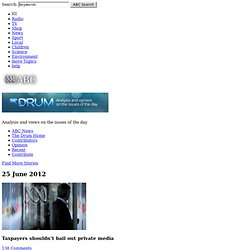
This question has been cast into sharp relief today by the resignations of the editorial leadership of both The SMH and The Age, and calls by newly minted media millionaire Alan Kohler for a national debate around the minimum number of journalists needed to safeguard an informed society. Yet Australia is already well-serviced by two very large, and taxpayer-funded, media entities: the ABC and the SBS.
Both publish comprehensive news, entertainment, and current affairs products across the television, radio, and internet mediums. In the last financial year, the ABC and SBS collectively received about $1.2 billion in taxpayer money. Why Fairfax matters. WHEN Rupert Murdoch came to Melbourne in October 2008, he met with Herald Sun editor-in-chief Bruce Guthrie and other senior News Limited executives.
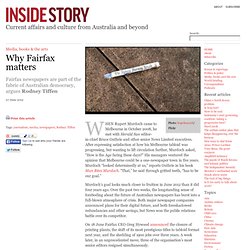
After expressing satisfaction at how his Melbourne tabloid was progressing, but wanting to lift circulation further, Murdoch asked, “How is the Age faring these days?” His managers ventured the opinion that Melbourne could be a one-newspaper town in five years. Murdoch “looked determinedly at us,” reports Guthrie in his book Man Bites Murdoch. “That,” he said through gritted teeth, “has to be our goal.” Murdoch’s goal looks much closer to fruition in June 2012 than it did four years ago. On 18 June Fairfax CEO Greg Hywood announced the closure of printing plants, the shift of its most prestigious titles to tabloid format next year, and the shedding of 1900 jobs over three years.
A few days after Hywood’s announcement, the head of News Limited, Kim Williams, made a similarly anticipated statement about his company’s plans. Related articles. Centre for Advanced Journalism » The Bottom Line – News or Profitability. This article, by Dr Margaret Simons, appeared first in today’s Crikey.
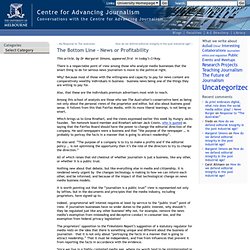
There is a respectable point of view among those who analyze media businesses that the smart thing to do for serious news journalism is move to the political right. Why? Because most of those with the willingness and capacity to pay for news content are comparatively wealthy individuals in business – business news being one of the things they are willing to pay for. Also, that these are the individuals premium advertisers most wish to reach. Among this school of analysts are those who see The Australian’s conservative bent as being not only about the personal views of the proprietor and editor, but also about business good sense.
Which brings us to Gina Rinehart, and the views expressed earlier this week by Hungry Jacks founder, Ten Network board member and Rinehart adviser Jack Cowin, who is quoted as saying that the Fairfax Board should have the power to change the editorial direction of the company. Know the Original Source of the News you Read, Watch, Hear & Tweet. Skip to main content Sign in PAGE ONE: Inside The New York Times 5 Things You Can Do Now.
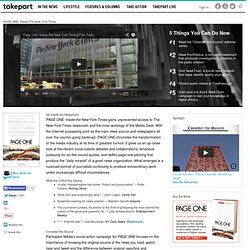
If you have news, it will be aggregated and/or curated. The Pew Research Center has come out with a massive new report on the state of media as part of its Project for Excellence in Journalism, and it comes to a number of conclusions about where the industry stands — including the fact that Twitter and Facebook are still driving a fairly small amount of traffic to media outlets (although this segment is growing quickly) and that tech giants like Google, Yahoo and Microsoft control almost 70 percent of online advertising.
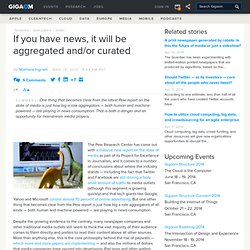
But one other thing that becomes clear from the Pew report is just how big a role aggregators of all kinds — both human and machine-powered — are playing in news consumption. Despite the growing evidence to the contrary, many newspaper companies and other traditional media outlets still seem to think the vast majority of their audience comes to them directly and prefers to read their content above all other sources. Aggregation is a way of life for more news consumers Social sharing is both an opportunity and a danger. Don’t think of it as a newspaper — it’s a data platform.